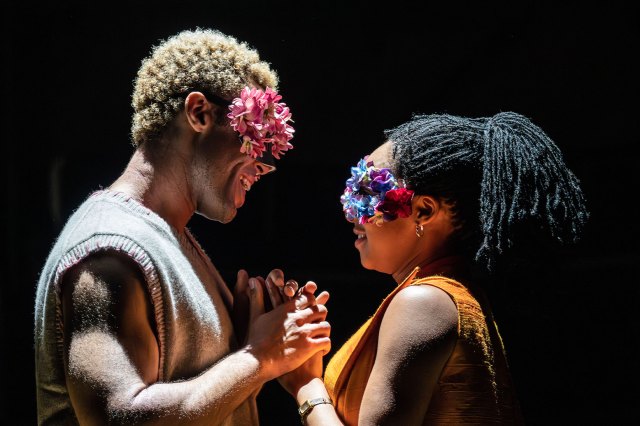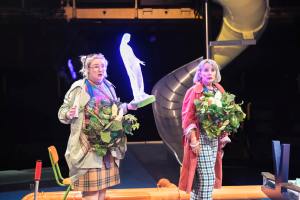Romeo and Juliet at the Royal Exchange Theatre – review
Nicholai La Barrie’s production runs until 18 November

The real insoluble feud in this production of Shakespeare’s play about a couple caught between two warring households is its two warring halves, both un-alike in solemnity. The first believes Romeo and Juliet to be a comedy; the second remembers it’s a tragedy.
It’s a problem for a play whose trajectory is to the grave. It’s tonally jarring to constantly wrap comedy around recurrent foreshadowing that the characters’ “lives shall pay the forfeit” – Capulet’s “We were born to die” gets a laugh. Nor can we take the feud seriously. It’s so ingrained and automatic that even the Nurse, here, threatens Romeo with a Stanley knife, but Gemma Ryan has done so much foolish bumbling and headmistress-shrieking that it prompts a laugh.
Designer Good Teeth shows how it plays out on the age-old molten, volcanic conflict, the stage a dark slate with orange cracks like magma. The platform that rises out of the floor is both nuptial bed and sacrificial altar. But the tragic impression of them as victims and collateral damage in a war of their parents’ making is faint. Making Capulet a woman removes the patriarchy of her father’s control and her further lack of agency.
Conor Glean’s Romeo clearly portrays how Juliet tames him. Aggressive and baleful when he’s with the men – his jaw jutting out at rivals. With her, his face eases and his body relaxes. He conveys first-love excitability, like a schoolboy trying to win a kiss from his crush. However, it seems misjudged to throw Juliet an unimpressed look at her proposal of marriage – again receiving laughter – because it suggests he’s only after a casual fling rather than a committed, lifelong union.
Shalisha James-Davis’s Juliet also initially lacks a sense of falling in love headlong to eternity – more pity than longing in her voice. She gives her balcony speech atop a tower, evoking classical fairytale images of princesses, dressed in orange like the sun he calls her. But she resists cliches. She’s headstrong with pragmatism, moving across the stage with drive rather than dizziness. When she clutches him at the end, before heartbreak comes a look of bewilderment at how the plan she’d carefully put together has fallen apart.
There’s less attention and care for the verse in the first half, sprinting loosely in a way that encourages the audience not to take it seriously. But this is a play where language is everything: where names determine mortal boundaries and fates. The iconic “wherefore art thou” speech is so commonly misunderstood as her asking where he is, instead of why he has that name and not one that allows them to marry. Here, his discovery of Juliet’s status is met with a half-hearted “oh” as though a minor inconvenience.
Some of the choices work to emphasise the ridiculousness of the quarrel, such as the factions using swords, baseball bats and axes that resemble prop weapons of play-fighting children. But so much downplays and compromises the tension, blunting the dagger’s point. The final line tells us “never was a tale of more woe”. If you can see past the irreverence, you might just believe it.


















